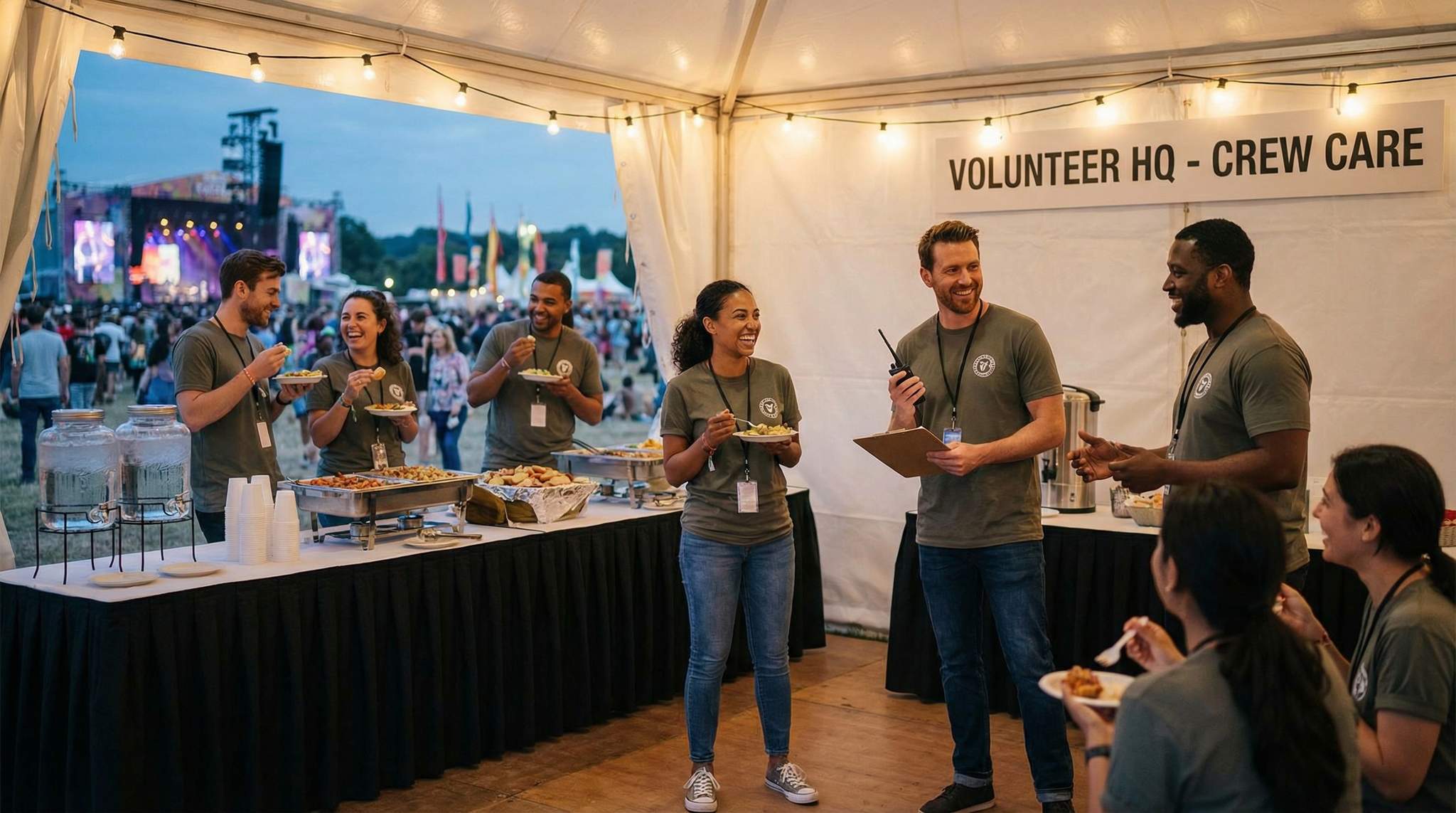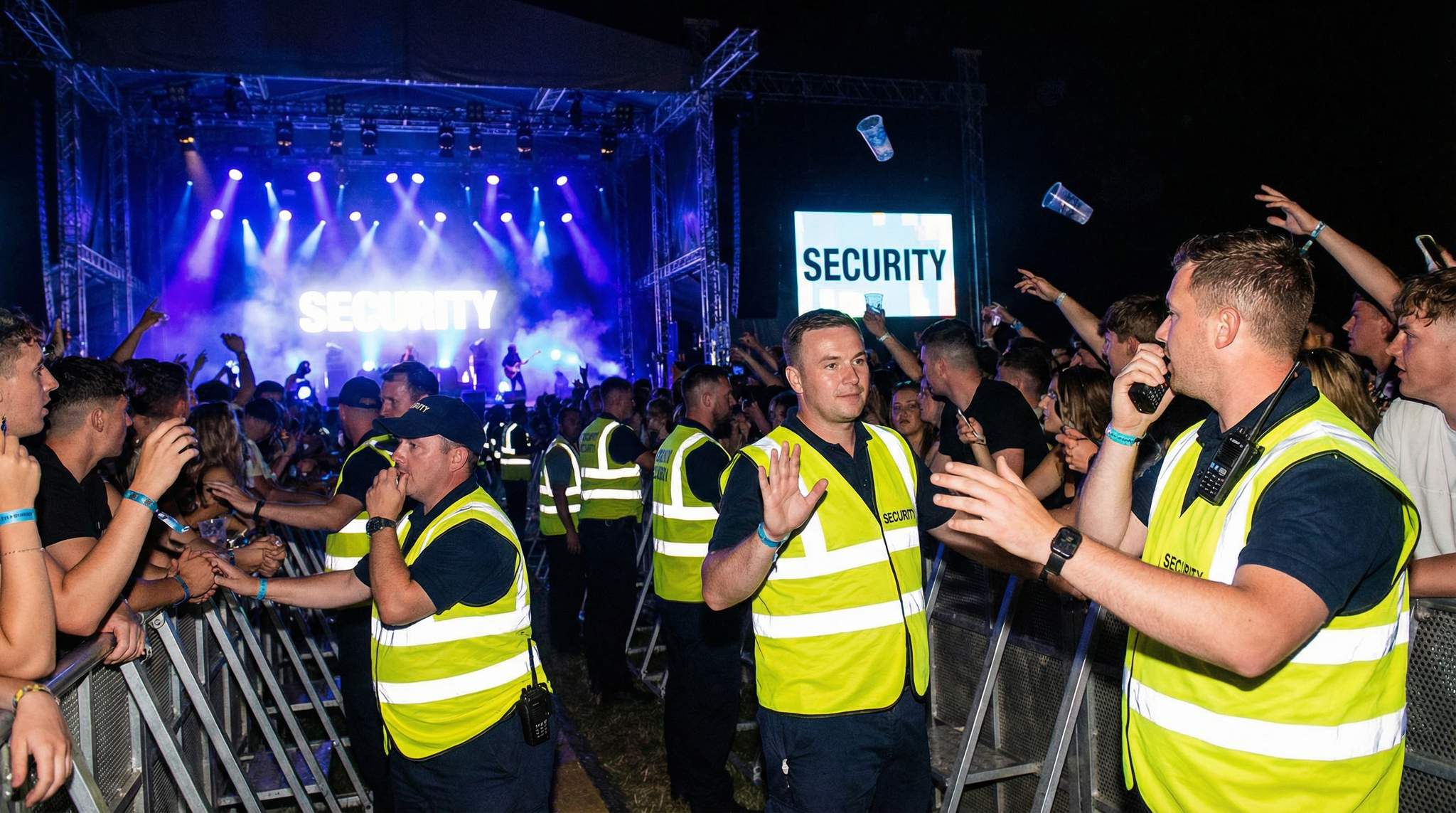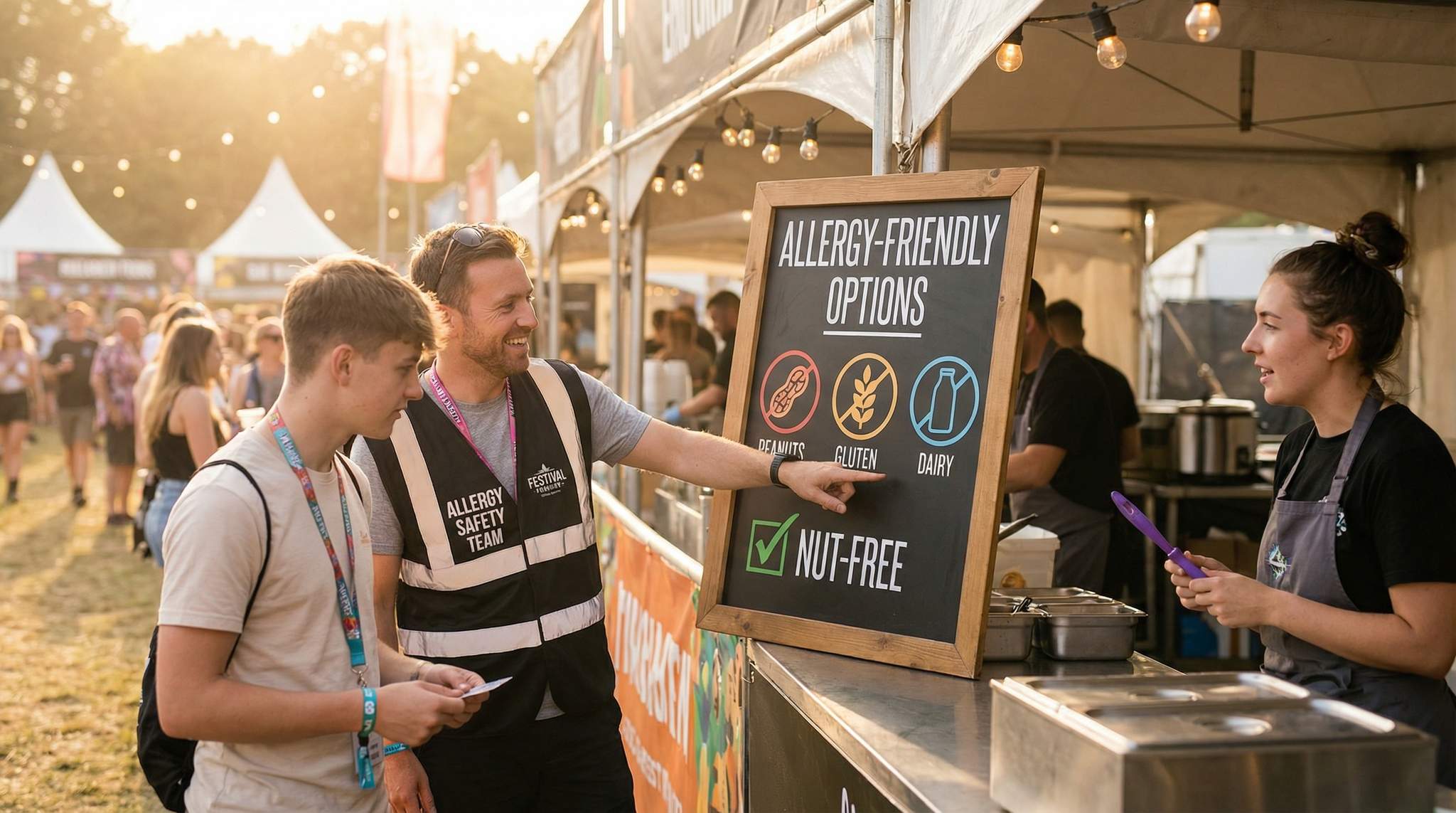Volunteers are the unsung heroes of many festivals, working behind the scenes for little more than a t-shirt, a meal, and a passion for the event. A strong volunteer programme – built on thorough preparation and genuine care – can be the deciding factor between a smoothly run festival and a logistical nightmare. In fact, veteran organisers agree that regardless of a festival’s size, the volunteer program will often lead to the absolute success of the event or its potential demise. From small community cultural festivals to massive international events (Burning Man, for example, enlists over 10,000 volunteers each year to build and operate Black Rock City), the principle is the same: take care of your volunteers, and they will take care of your festival.
This guide draws on decades of festival production experience across the globe to help the next generation of festival producers build volunteer programs rooted in care. It offers practical, actionable advice – from recruiting volunteers via schools and community groups, to training them in radio skills and cultural etiquette. It also covers how to keep volunteer teams happy and motivated through good food, hydration, rest, recognition, and growth opportunities. Whether you’re running a boutique art festival in New Zealand or a giant cultural celebration in India, these insights will help ensure your volunteer workforce is reliable, enthusiastic, and empowered to make the event a success.
Building a Volunteer Team Through Community Recruitment
One of the first steps to a successful volunteer programme is recruiting the right people from within the community. Experienced festival producers know that enthusiasm and local pride can be as important as event skills. Tapping into schools, university clubs, and community groups is a smart strategy to find volunteers who care. High school and college students often seek volunteering opportunities for experience – for example, the Toronto International Film Festival (TIFF) attracts hundreds of student volunteers each year, with the festival openly acknowledging that “without you, there will be no TIFF”. Community organisations like cultural clubs or sports teams can also supply dedicated helpers; in Denmark, the Roskilde Festival partners with local clubs (from scout troops to martial arts dojos) whose members volunteer in exchange for fundraising donations to their club. This not only fills volunteer roles but also deepens the festival’s roots in the community.
Outreach is key. A festival organiser should actively reach out to local schools and universities – post volunteer opportunities on campus job boards or speak in classes related to events and hospitality. Many festivals have found success by liaising with professors or student leaders in event management courses to recruit eager interns and volunteers. Similarly, sending information to community centres, youth groups, and non-profits can bring in volunteers motivated by the festival’s cause or theme. For instance, a community food festival might recruit members of cooking clubs or food rescue charities as volunteers, aligning their interests with the event. The Mile of Music festival in Appleton, Wisconsin, demonstrates how powerful community recruitment can be – over 500 people volunteer each year at that local music festival, underscoring that volunteers are truly key to the event’s success.
When recruiting, highlight the perks and values of volunteering to make the offer compelling. Be transparent about what volunteers get in return for their time: free festival entry on off-days or after shifts, a cool festival t-shirt, meals, or even access to special performances. Emphasise the less tangible rewards too – meeting artists, gaining backstage experience, or being part of a culturally important celebration. Many successful festivals turn volunteering into a fun, social opportunity. They allow friends to sign up together or host pre-festival meet-and-greet sessions so that new volunteers feel welcome. By promoting these benefits (for example, complimentary entry or free food), you not only attract more candidates, but also set a positive tone from the start that this festival values its people.
Training Volunteers with Scripts, Radios, and Cultural Etiquette
Once you have assembled a volunteer team, thorough training and orientation are essential. Volunteers may be enthusiastic but still need guidance to perform their roles confidently and safely. A well-structured training programme should cover the event basics, role-specific duties, and the soft skills of customer service and cultural awareness.
Planning a Festival?
Ticket Fairy's festival ticketing platform handles multi-day passes, RFID wristbands, and complex festival operations.
Start with the basics: provide a briefing on the festival’s schedule, layout, and chain of command. Volunteers should know where to check in, who their supervisor or team leader is, and how to contact key staff. Many festivals provide a volunteer handbook or an online orientation video beforehand. It’s also wise to include an emergency procedure overview – for example, what to do if there’s a medical incident or where to direct people during an evacuation. Being prepared for incidents is part of training volunteers to be an asset rather than a liability during high-pressure moments.
Role-play and scripts can be extremely helpful, especially for front-facing roles. Give volunteers sample scripts or FAQs for common scenarios: how to greet attendees, how to answer frequently asked questions (“Where are the restrooms?” or “What time does the next performance start?”), and how to handle minor conflicts or lost individuals (e.g., children searching for parents). By rehearsing these scenarios, volunteers gain confidence. At many cultural festivals, volunteers act as ambassadors – for instance, at international film festivals or arts festivals, volunteers might be the first point of contact for VIP guests or artists. Training them with polite greeting scripts and professional etiquette ensures the festival’s image is well represented.
Don’t forget radio training for festivals large enough to require walkie-talkie communication. Proper radio etiquette at events is crucial for safety and efficiency. Teach volunteers the basics like how to operate the radio, which channel to use, and clear lingo such as “Copy,” “Stand by,” or the festival’s chosen call signs. Emphasise concise communication and listening before speaking (“break” and “go ahead” protocols). As a simple rule, many event teams use a system where someone needing to reach a person says “Go for [Name]” – for example, “Go for Mike” – to keep radio chatter organised. Providing a one-page cheat sheet of radio codes and important numbers (like the supervisor’s phone or first aid station) can save precious time during the event.
Equally important is training in cultural etiquette and sensitivity, especially for cultural festivals or events with international audiences. Volunteers should be briefed on the cultural context of the festival – its traditions, any religious or cultural protocols, and the diverse backgrounds of attendees. For example, if you’re hosting a multicultural festival or a world music event, teach volunteers a few key greetings in the languages common among your performers or guests, or explain specific customs (such as forms of address or whether a gesture could be impolite in a certain culture). In Singapore’s Chingay Parade, for instance, volunteers interact with performers from various ethnic communities, so understanding basic cultural dos and don’ts helps avoid misunderstandings. Similarly, at a large international event like the Smithsonian Folklife Festival in the US, volunteers receive context about the cultural exhibits so they can assist visitors respectfully and knowledgeably. This cultural awareness training fosters an inclusive atmosphere and prevents accidental offence. It also makes volunteers themselves feel more confident in engaging with attendees from different cultures.
Finally, encourage a mindset of professionalism and empathy. Remind volunteers that they are representatives of the festival. A friendly, culturally aware volunteer can leave a lasting positive impression on festivalgoers, whereas an unprepared volunteer might do the opposite. By investing time in training – from communication protocols to cultural sensitivity – festival producers equip their volunteer team to handle their duties with competence and courtesy.
Feeding, Hydration, and Rest: Taking Care of Volunteer Welfare
Festivals, especially outdoor ones, can be physically demanding environments. Long hours on one’s feet, summer sun or unpredictable weather, and the hustle of large crowds all take a toll. That’s why veteran festival organisers insist on taking care of volunteer welfare as a top priority. Simply put, well-cared-for volunteers are more energetic, safe, and reliable.
Need Festival Funding?
Get the capital you need to book headliners, secure venues, and scale your festival production.
First and foremost, keep volunteers well-fed and hydrated. Provide generous meals or snacks and constant access to water. Avoid the trap of giving volunteers nothing but junk food or letting them go hungry because the only option is a long queue at a vendor. As one festival operations veteran bluntly put it, “stop feeding your crew meals that might be light on the wallet but sure as hell aren’t light in sodium and fat”. Heavy, unhealthy food can sap energy during multi-hour shifts. Instead, aim for nutritious, filling options whenever possible – think sandwiches or wraps, fruits, salads, or pasta that sustains energy. If your festival has catering, arrange dedicated meal times for volunteers or meal vouchers they can use at food stalls. Some festivals set up a crew canteen on-site; others partner with food vendors to offer quick volunteer meals at any time of day. Make sure to account for dietary restrictions: gather info on allergies or vegetarian needs during recruitment and have alternatives ready.
Hydration is equally critical. Outdoor festivals often happen under the sun, and volunteers hustling around can easily get dehydrated. Provide water stations backstage and in all volunteer areas, and hand out reusable water bottles if possible. Large events like Coachella or Glastonbury ensure there are ample water refill stations and encourage all staff and volunteers to carry a bottle with them. Consider supplying sports drinks or electrolyte replenishments in extremely hot climates. If your event is in a hot location or season, also offer sunscreen and shaded areas as part of volunteer care – a sunburnt, overheated volunteer won’t be able to do their job well.
Structured breaks and rest areas are a must. Schedule volunteers in shifts that are reasonable in length. Industry best practice suggests volunteers should not work more than about 6–8 hours in a stretch. In fact, giving volunteers a chance to also enjoy the festival can be a great morale booster – many music festivals schedule volunteers so they have some off-duty time to catch their favourite band’s set or explore the event. Overworking volunteers is counterproductive; tired volunteers are more likely to make mistakes or even quit mid-event. Provide a quiet space, tent or lounge where volunteers can take breaks out of the crowd. This could be a simple as a shady area with chairs and water, or a staff room with refreshments. For example, Roskilde Festival in Denmark offers a dedicated volunteer camping area and a lounge for off-duty volunteers to relax, reinforcing that they are part of the community, not just free labour.
Other small touches can make a big difference in volunteer comfort. Ensure there are first aid provisions accessible to volunteers (like band-aids, pain relievers, or access to medical staff for any issues). Offer protective gear if needed (rain ponchos, gloves, torches for night shifts). If the festival runs late, plan safe transportation for volunteers after their shift – whether it’s providing shuttle rides (as Roskilde does with free volunteer buses) or coordinating carpools. These measures show volunteers that their well-being is important. As a result, they’ll be more willing to go the extra mile in their duties.
Credentials, Recognition and Pathways into Paid Roles
A volunteer programme rooted in care doesn’t just look after volunteers’ physical needs – it also nurtures their personal development and acknowledges their contributions. One effective strategy is to provide credentials or certificates for the service volunteers have given. For example, after the event, you might give each volunteer a signed certificate of appreciation that notes the hours they contributed and the skills they demonstrated (such as “team leadership” or “customer service”). This kind of documentation can be valuable to volunteers – especially students or young professionals – as they can add it to their CVs or portfolios when seeking jobs in events, hospitality, or related fields.
Beyond paperwork, consider creating pathways for volunteers to move into paid staff roles over time. Many of today’s top event staff and festival managers started out as volunteers learning the ropes. If you notice a volunteer who is especially responsible, proactive, and great at what they do, encourage them to take on bigger roles at the next events. Some festivals formalise this by offering a “volunteer-to-staff” pipeline: for instance, Glastonbury Festival in the UK has long worked with charity volunteer stewards (like those from Oxfam’s festival team), and quite a few of those folks have later joined the festival’s freelance staff for operations and management in subsequent years. By letting volunteers know there’s an opportunity to progress – say, becoming a team leader or applying for seasonal paid roles – you give ambitious volunteers an incentive to excel. Even if you can’t promise a job, you can offer to be a reference or write recommendation letters for standout volunteers who are job-hunting. These gestures cost little but carry a lot of weight in showing volunteers that the festival is invested in their future.
Recognition and rewards also reinforce a caring culture and motivate volunteers. Publicly acknowledge volunteers’ efforts during and after the festival. This could be a thank-you speech by the festival director at the closing, social media shout-outs, or a dedicated volunteer appreciation post with photos. Some festivals run award programmes for volunteers: for example, the Sydney Gay and Lesbian Mardi Gras in Australia actually holds an annual Volunteer Awards night to “honour and thank the extraordinary community groups and volunteers who go above and beyond to help deliver” their world-renowned festival. Celebrating volunteers in this way not only makes those individuals feel great – it also signals to the whole community that volunteering is valued, which can attract more helpers next year.
Tangible rewards can complement the experience too. Many festivals give small thank-you gifts like a commemorative pin, a photo with the headlining artist, or a post-event pizza party exclusively for volunteers. Swag such as branded hoodies or tote bags can turn volunteers into proud ambassadors for your festival in the broader community. And of course, if your budget allows, throwing a volunteer after-party or offering free tickets to another event you organise is a fantastic way to reward their hard work. Remember, a little generosity goes a long way in building goodwill.
How Caring Programs Increase Reliability and Retention
All of these efforts – from mindful recruitment and thorough training to volunteer welfare and recognition – tie back to a simple truth: when volunteers feel cared for, they are significantly more reliable. Reliability here means more than just showing up (though that’s obviously critical); it means volunteers who are attentive on the job, willing to solve problems, and eager to return for future events.
On the flip side, if volunteers feel ignored, exploited, or unappreciated, they will disengage. There are many cautionary tales in the events world of volunteers dropping out at the last minute or not performing well because they felt disrespected. As Volunteer Ireland notes, organisations often “fail to retain volunteers because many do not feel valued or involved”. The last thing a festival needs is to lose half its volunteer force mid-event due to preventable dissatisfaction. Caring for your volunteers is not just a nice-to-have – it’s a risk management strategy to ensure you have the team you planned on. A volunteer who is well looked after is far more likely to show up on time for their shift every day, complete their full commitment, and pay attention to details while working.
Furthermore, a positive volunteer experience tends to snowball year over year. Festivals that treat volunteers as part of the family often see a high return rate. For example, many volunteers at the Galway International Arts Festival in Ireland come back every summer; one volunteer, Yeliz, said she keeps returning because of the strong sense of organization and community among the volunteers. That sense of camaraderie and belonging is built by festival leadership’s caring approach. When volunteers return annually, it saves the organisers effort on recruitment and training, and these seasoned volunteers often recruit their friends too – solving the cycle of needing new people all the time.
Reliability also improves during the event itself. Volunteers who are respected and enjoy their work will go the extra mile to ensure the festival runs well. They’re more likely to take initiative, whether that’s staying an extra hour when a show runs late or jumping in to help in an unrelated area if they see a need. In essence, volunteers mirror how they are treated. A festival culture that’s rooted in empathy and care encourages volunteers to exhibit dedication and responsibility in return.
Finally, a caring volunteer programme enhances the festival’s public image and community relations. Attendees can tell when staff and volunteers are happy – it translates into friendly service and a welcoming atmosphere. Volunteers who have great experiences will talk about it, creating positive word-of-mouth. They become ambassadors who promote the festival in the community, which can boost attendance and sponsor interest. In contrast, festivals that burn through volunteers by treating them poorly may find it harder to recruit in the future as word spreads. Thus, investing in volunteer care is investing in the festival’s long-term success and reputation.
Frequently Asked Questions
How can festivals effectively recruit volunteers from the local community?
Festivals recruit effectively by tapping into schools, university clubs, and community groups where enthusiasm runs high. Organizers should actively reach out via campus job boards and partner with local organizations, sometimes offering donations in exchange for help. highlighting perks like free entry, meals, and social opportunities helps attract dedicated candidates.
What topics should be covered in festival volunteer training programs?
A comprehensive training program covers event basics, chain of command, and emergency procedures. It should include role-playing with scripts for common FAQs and radio etiquette for clear communication. Crucially, training must address cultural etiquette and sensitivity to ensure volunteers interact respectfully with diverse attendees and international performers.
How should festival organizers manage volunteer food and hydration?
Organizers must prioritize nutritious, filling meals over unhealthy snacks to sustain energy during long shifts. Providing constant access to water stations and accounting for dietary restrictions is essential. Best practices include arranging dedicated meal times, offering vouchers for food vendors, or setting up a crew canteen to keep the team fueled.
Why is volunteer care important for festival reliability and retention?
Prioritizing volunteer care directly increases reliability, ensuring staff show up on time and fulfill commitments. When volunteers feel valued rather than exploited, they are less likely to drop out mid-event. A positive experience encourages high return rates, as seen at the Galway International Arts Festival, reducing future recruitment efforts.
Can festival volunteering lead to paid staff positions?
Volunteering often serves as a pathway to paid roles, with many top event managers starting as unpaid helpers. Festivals like Glastonbury utilize a volunteer-to-staff pipeline to hire proactive individuals for future operations. Organizers can support this growth by providing certificates of service and reference letters for standout volunteers.
How long should festival volunteer shifts be for optimal performance?
Industry best practices suggest that volunteer shifts should not exceed 6 to 8 hours at a time. Limiting shift lengths prevents exhaustion and ensures volunteers remain energetic and attentive. Allowing them off-duty time to enjoy the festival boosts morale and reinforces that they are valued members of the event community.





